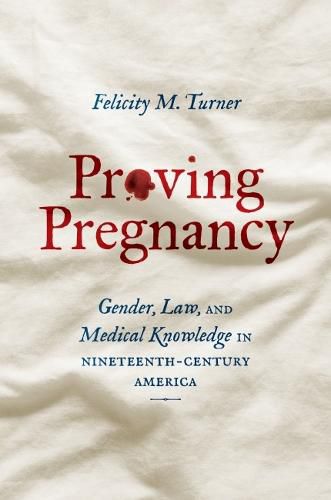Readings Newsletter
Become a Readings Member to make your shopping experience even easier.
Sign in or sign up for free!
You’re not far away from qualifying for FREE standard shipping within Australia
You’ve qualified for FREE standard shipping within Australia
The cart is loading…






Examining infanticide cases in the United States from the late eighteenth to the late nineteenth centuries, Proving Pregnancy documents how women-Black and white, enslaved and free-gradually lost control over reproduction to male medical and legal professionals. In the first half of the nineteenth century, community-based female knowledge played a crucial role in prosecutions for infanticide: midwives, neighbors, healers, and relatives were better acquainted with an accused woman’s intimate life, the circumstances of her pregnancy, and possible motives for infanticide than any man. As the century progressed, women accused of the crime were increasingly subject to the scrutiny of white male legal and medical experts educated in institutions that reinforced prevailing ideas about the inferior mental and physical capacities of women and Black people. As Reconstruction ended, the reach of the carceral state expanded, while law and medicine simultaneously privileged federal and state regulatory power over that of local institutions. These transformations placed all women’s bodies at the mercy of male doctors, judges, and juries in ways they had not been before.
Reframing knowledge of the body as property, Felicity M. Turner shows how, at the very moment when the federal government expanded formal civil and political rights to formerly enslaved people, the medical profession instituted new legal regulations across the nation that restricted access to knowledge of the female body to white men.
$9.00 standard shipping within Australia
FREE standard shipping within Australia for orders over $100.00
Express & International shipping calculated at checkout
Examining infanticide cases in the United States from the late eighteenth to the late nineteenth centuries, Proving Pregnancy documents how women-Black and white, enslaved and free-gradually lost control over reproduction to male medical and legal professionals. In the first half of the nineteenth century, community-based female knowledge played a crucial role in prosecutions for infanticide: midwives, neighbors, healers, and relatives were better acquainted with an accused woman’s intimate life, the circumstances of her pregnancy, and possible motives for infanticide than any man. As the century progressed, women accused of the crime were increasingly subject to the scrutiny of white male legal and medical experts educated in institutions that reinforced prevailing ideas about the inferior mental and physical capacities of women and Black people. As Reconstruction ended, the reach of the carceral state expanded, while law and medicine simultaneously privileged federal and state regulatory power over that of local institutions. These transformations placed all women’s bodies at the mercy of male doctors, judges, and juries in ways they had not been before.
Reframing knowledge of the body as property, Felicity M. Turner shows how, at the very moment when the federal government expanded formal civil and political rights to formerly enslaved people, the medical profession instituted new legal regulations across the nation that restricted access to knowledge of the female body to white men.